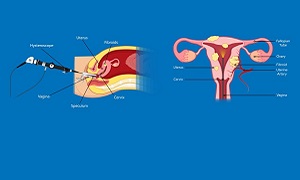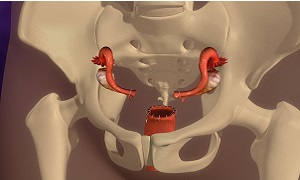Menorrhagia (Heavy Menstrual Bleeding)
When a woman suffers from menstrual periods with abnormally prolonged or heavy bleeding, it is termed as menorrhagia. Around 1 in every 20 women is known to have menorrhagia.
Sometimes, the bleeding can get very heavy, and even require changing a tampon or pad every two hours. It can also mean passing clots the size of a quarter or even larger.
If left untreated, menorrhagia can cause anemia. The heavy bleeding can also affect sleep, and lead to abdominal pain, and make enjoyable activities a burden.
If you are experiencing weakness and disruption to everyday life, because of heavy bleeding, then you can talk to your doctor for treatment options.
Symptoms
The signs and symptoms of this condition include the following:
- Soaking through more than a single sanitary pad or tampons every hour for several consecutive hours
- Needing to wake up and change sanitary protection during the night
- Needing to use double sanitary protection to control the menstrual flow
- Bleeding for more than one week
- Passing blood clots larger than a quarter
- Symptoms of anemia, which can include tiredness, fatigue or shortness of breath
- Restricting daily activities because of heavy menstrual flow
It is noteworthy that the symptoms of menorrhagia might resemble other conditions or medical issues, and therefore it is important to talk to your healthcare provider for a diagnosis.
Causes
Sometimes, the cause of heavy menstrual bleeding is unknown, but a number of conditions can lead to menorrhagia. Some of the causes are:
Hormone imbalance- In a regular menstrual cycle, a balance between the hormones estrogen and progesterone helps to regulate the buildup of the lining of the uterus, i.e. endometrium, which is shed during menstruation. If there is a hormone imbalance, the endometrium develops in excess and sheds eventually, through heavy menstrual bleeding.
There are multiple conditions that can lead to hormone imbalances, including polycystic ovary syndrome, insulin resistance, obesity, and thyroid problems.
Polyps- Small, benign growths on the lining of the uterus i.e. uterine polyps, can also lead to heavy or prolonged menstrual bleeding.
Adenomyosis– This condition is known to occur when glands from the endometrium become embedded in the uterine muscle, which causes heavy bleeding as well as painful periods.
Dysfunction of the ovaries- If your ovaries don’t release an egg during a menstrual cycle, then your body is not producing the hormone progesterone, as it would during a normal menstrual cycle. This might lead to hormone imbalance, eventually resulting in menorrhagia.
Uterine fibroids- These are noncancerous tumors of the uterus and they appear during your childbearing years. Uterine fibroids can also cause prolonged or heavier menstrual bleeding.
Intrauterine device- Menorrhagia can also be a side effect of using a non-hormonal intrauterine device for birth control. You can discuss with your doctor to plan any alternative management options.
Inherited bleeding disorders- Some bleeding disorders, for example, von Willebrand’s disease, a condition in which an important blood-clotting factor is deficient or impaired, may also lead to abnormal menstrual bleeding.
Medications- Certain medications, including anti-inflammatory medications, hormonal medications, and anticoagulants can also contribute to heavy or prolonged menstrual bleeding.
Pregnancy complications- A single, heavy, late period can be caused by a miscarriage. An unusual location of the placenta can also lead to heavy bleeding during pregnancy.
Cancer– Uterine cancer and cervical cancer can lead to excessive menstrual bleeding as well.
Other medical conditions- There are multiple other medical conditions, including liver or kidney disease, which may also be associated with menorrhagia.
Diagnosis
To diagnose your condition, your healthcare provider is going to ask you regarding your medical history, as well as your periods. You will also need to undergo a physical exam, including a pelvic exam. You will likely be asked to keep a track of your periods and how many tampons and pads you require for a few months.
Your doctor may recommend one or more of the following tests:
Blood tests
Pap test
Ultrasound
Biopsy
Hysteroscopy
Treatments
Treatment for this condition depends on the seriousness of your bleeding, and the causes, your health, age as well as your medical history. Treatment also depends on how you respond to certain medications and your wants and needs. You may not want to have a period at all, or just want to reduce the amount of bleeding. If you are not having anemia, you may even choose to skip treatment.
Some of the treatments include:
- Iron supplements to put more iron into your blood
- Birth control to make periods more regular as well as to reduce bleeding
- Medications for reducing any pain and amount of bleeding
- Antifibrinolytic medicines in order to reduce the bleeding
- Desmopressin nasal spray to stop the bleeding for certain bleeding disorders
- Intrauterine contraception to make periods more regular and reduce bleeding
- Hormone therapy to reduce the bleeding
You might also need surgical treatment if medications are unsuccessful. Some of the procedures that might be recommended include:
Focused ultrasound surgery
Myomectomy
Endometrial ablation
Endometrial resection
Hysterectomy
Complications
Excessive or prolonged menstrual bleeding might lead to some other medical conditions, which includes:
- Anemia- Menorrhagia can lead to blood loss anemia as it reduces the number of circulating red blood cells. The number of circulating red blood cells is measured by hemoglobin, a protein that helps to enable red blood cells to carry oxygen to the tissues. Iron deficiency anemia occurs when your body uses your iron stores to make more hemoglobin, as your body attempts to make up for the lost red blood cells. Signs and symptoms can include pale skin, fatigue, and weakness. Diet also plays a role in iron deficiency anemia, and heavy menstrual periods make the problem further complicated.
- Severe pain- Along with heavy menstrual bleeding, you might also experience painful menstrual cramps. Sometimes the cramps which are associated with menorrhagia can also be severe enough to require medical evaluation.






